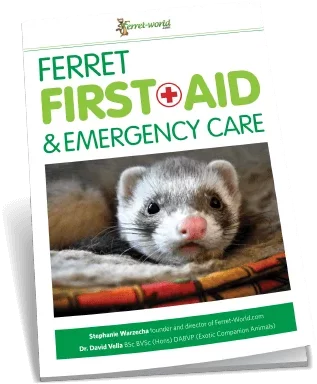
Buying your ferret
Adopting your ferret from a ferret shelter or buying one from a credible breeder can help reduce any future health care costs. Ferret shelters only adopt out ferrets that are already spayed or neutered, vaccinated, and checked by a vet. Ferrets from reputable breeders tend to be genetically healthier than pet shop ferrets, so they may cost more initially, but save you vet bills in the long run.
To learn more, we recommend reading:
- Where to find ferrets for sale
- Ferret adoption
- Ferret breeders
- Ferret shelter directory

Helping Your Ferrets Live Healthier, Happier Lives
Join other ferret owners and experts and get access to Dook Dook Ferret Magazine, Ferret-World Members Community and other Resources!
Veterinary costs
Because ferrets are considered exotic pets, vet costs can be quite expensive. Before getting a ferret, find out how much it costs to see the ferret vet(s) in your area.
You should be prepared to pay for at least one major veterinary procedure during your ferret’s lifetime. Ferrets are predisposed to a variety of disease and are also quite talented at getting into places they shouldn’t, making them prone to accidents and injury.
Many new ferret owners assume that buying a young ferret will save them from vet bills for a while. This is untrue. Unfortunately, ferret diseases do occur in young ferrets, so you may find yourself shelling out a lot of money within your ferret’s first couple years. If you cannot afford a high vet bill immediately, wait until you can to get a ferret.
We recommend setting up a separate bank account or trust to save for ferret vet bills, so that you are prepared when your ferret gets sick or injured.
Lifetime vet bills: ~ $7,000 USD
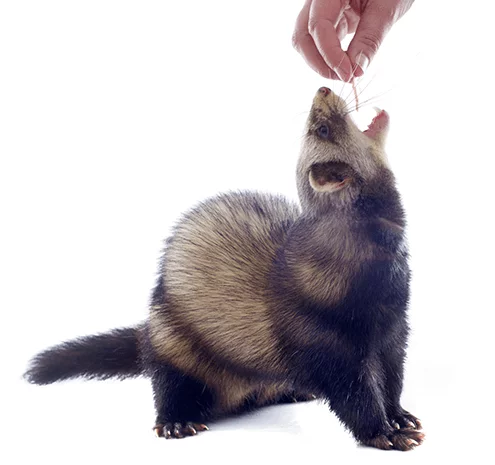
Food
The food you feed your ferrets will impact their health and thus your vet bills. Ferrets are obligate carnivores, meaning that they are physiologically designed to eat only meat. They do not have the enzymes needed to properly digest plant matter. Unfortunately, many commercial pet food companies still put a lot of plant matter in their foods. Feeding your ferret a food high in plant matter will mean that your ferret is not getting the nutrients they need. Malnourished ferrets are more likely to get sick.
A high-quality ferret diet is the foundation of your ferret’s health and well-being. You should never choose a food because it is cheaper. There is a debate among ferret owners as to whether a high-quality kibble diet or a raw meat-based diet is best for your ferret, but either way you will spend $30-100 a month feeding your ferret.
Ferret food: $30-100 USD per month
Cages and carriers
You need to get a good primary living ferret cage before you get your ferret. When purchasing a cage, you want to make sure it is safe for the ferret, has plenty of space, is not possible for the ferret to escape, is free of hazards, has adequate ventilation, and is easy to clean.
You will also need to buy a carrier to transport your ferret to and from the vet. If you have two or more ferrets, you should also invest in a smaller spare cage to quarantine a ferret who has a contagious disease, so they won’t pass it on to their cagemates.
Ferret cage: ~ $250 USD
Ferret carrier: $30-$60 USD
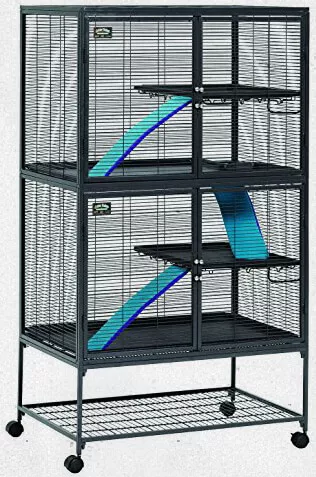
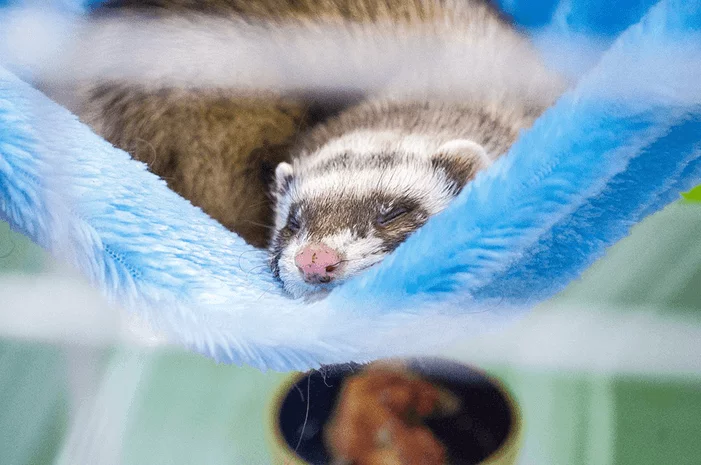
Bedding
Because you should change and wash your ferret’s bedding every week, it is a good idea to have at least one spare set of bedding.
Bedding should consist of at least blankets, sleep sacks, cubes or other enclosures, and/or hammocks. Ferrets need warm, dry, clean, and dark spaces to sleep in. They also enjoy being able to choose from different sleep options, so make sure they have three or more kinds of bedding.
Bedding over a ferret’s lifetime: ~ $500 USD
Litter and litter boxes
Your ferret must use dust-free litter like recycled newspaper pellets. This kind of litter does not clump like cat litter, so cleaning it out typically means removing a lot of the litter and replacing it. Since you should clean your ferret’s litter every day, you will go through quite a bit of litter during your ferret’s lifetime. Typically, you can expect to go through about 24 pounds (11 kilograms) of litter per month.
Litter trays for ferrets must be large enough for all four paws to fit and have a high back. You will typically need at least two of these for their cage and additional ones for when they are playing outside their cage.
Litter over a ferret’s lifetime: ~ $2000 USD
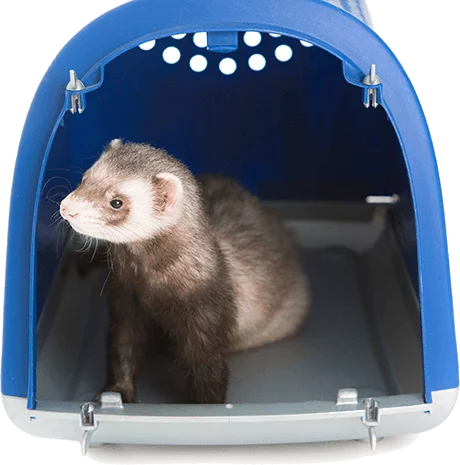

Toys
Ferrets are very intelligent, curious, fun-loving animals. They need to be mentally stimulated or they will become bored or depressed. Even with toys that they enjoy, they will often get bored of them eventually. This means that you will need to regularly rotate their toys and buy or make new ones often.
Ferret toys over a lifetime ~ $500 USD
101 Homemade Ferret Toys and Games eBook = $17 USD
Flea and/or heartworm treatments
Depending on where you live, you should treat your ferrets with medication that prevents fleas and/or heartworm.
Treatments per month: $15 per month


+Total costs
You’ll also need to buy your ferret water bowls, food bowls, and some things that are simply unpredictable. Ferrets are not cheap animals to keep. Make sure that you can afford what your ferret needs before you get one!
Total estimated cost of a ferret over a 7-year life: ~ $15,500 USD
